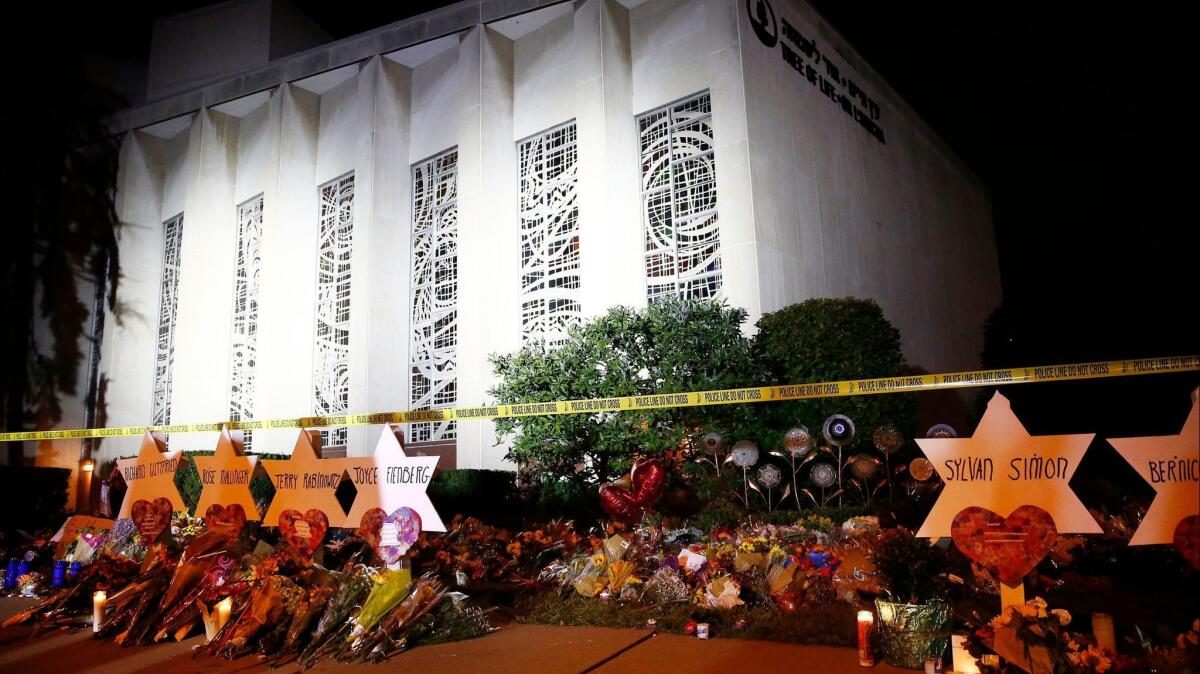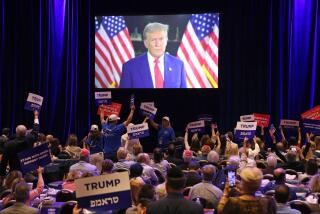Op-Ed: After the Tree of Life shooting, my children will grow up less secure than their parents

To a boy, the synagogue at the corner of Shady and Wilkins avenues in Pittsburgh’s Squirrel Hill neighborhood was enormous. It contained worlds within worlds.
To the right, the three floors of classrooms that you advanced down by the year, aleph to hay, starting at the same third floor where Robert Bowers holed up after allegedly killing 11 worshipers with an AK-15 and 3 Glocks. To the left, the main sanctuary, off-limits to us little pishers except for actual services and finally, our bar or bat mitzvahs, our turn to take our place in the room where Bowers opened fire on a mostly older crowd of early-arriving congregants.
Having shifted impatiently in those seats as an 8-year-old, and steered my aging mother to them as an adult, I felt able — compelled — on Saturday to imagine the horrific scene as it played out for the victims. Confusion turning to incredulity turning to terror in the realization they were being massacred, like Jews before them, but now in their hometown synagogue in America.
I knew one of the victims, Joyce Fienberg, for decades. A lovely sweet-souled woman, she was saying Kaddish for her husband, Stephen, even though he had died two years earlier and the statutory period for mourning had long passed. May her memory be a blessing.
Jews of course were at risk in the world, but the United States was a safe haven.
For me, the Tree of Life compound got downsized to its real proportions when I returned to Pittsburgh, Rip Van Winkle-like, after being away for 20 years. I came back as a United States attorney, heading the same office that will now bring hate crime charges, and probably seek the death penalty, against Bowers starting this week.
I had become one of the machers working with across religious groups to promote interfaith dialogue and build trust for federal, state and local law enforcement. That sort of work will be much needed in the wake of the Tree of Life tragedy. Pittsburgh, famously cohesive, decent and down to earth, will no doubt pull it off.
Now Tree of Life is once again strangely outsized for me, a national and even international symbol as the site of the worst act of anti-Semitic violence in U.S. history. Video and photographs of the corner I know like the back of my hand were broadcast nonstop over the weekend. The 1950s building has become a monument to terror as much as a house of worship.
America itself is experiencing a similar sort of sine curve, a queasy reality for a country that, save only for Israel, has been the most secure and accepting of Jews in history.
I was raised by parents and teachers for whom the Holocaust was a living memory. As a boy in Pittsburgh, I had a child’s ingenuous, wide-eyed fear that Nazis would come and take us in the middle of the night. I planned escape routes and calibrated who would hide me in their basement.
Coming of age, that all seemed a childish fear. Jews of course were at risk in the world, but the United States was a safe haven. Anti-Semitism had been reduced to a mild condescending form among an older white-shoe elite. The more virulent strains were socially unacceptable, and despite occasional outrages — a gunman at the Jewish Community Center in L.A., a bludgeoning in Seattle — there seemed little prospect it would ripen into a mass killing of American synagogue-goers.
Not that our Jewish “otherness” was forgotten. It made Jews quick to identify with and support the downtrodden. Jewish voters are the one group in American political life that consistently casts ballots against their economic interests. They tend to follow the biblical injunction, “love you therefore the stranger; for you were strangers in the land of Egypt.”
Now, crazily, that foundation feels newly unstable. As of Saturday, my children are less secure than were their parents. The threat is not existential, but it is real and vivid all the same.
Enter the Fray: First takes on the news of the minute from L.A. Times Opinion »
Guards will be posted outside synagogues as a matter of course, as they are in Israel and France. Congregants will quicken their steps and look around for suspicious figures as they arrive to pray. I expect Squirrel Hill and Jewish communities everywhere to rebound with hope, resolve and sechel — good sense; and yet the anxiety of being Jewish will increase.
Our royal schmuck of a president, and the gonifs in the Republican caucus who enable him, surely bear some of the blame. It is beyond argument that Trump seeks to polarize and stoke the grievances of the Robert Bowerses of the world; it is a conscious political strategy.
Now a self-proclaimed nationalist — never a good term to Jewish ears — Trump is, at best, indifferent to the effect of his dog-whistle demonizing on his more rabid followers. Tuesday he travels to Pittsburgh, where Jewish leaders have announced he is not welcome until he renounces white nationalism. Their pleas will accomplish bupkis.
It remains to be seen whether this nation will return to pre-Trumpian levels of decency and tolerance. For now, American Jews find themselves wondering, as they haven’t in 70 years, from where the next gunshots will come.
Harry Litman is a former U.S. attorney and deputy attorney general. He practices law and teaches at UC San Diego.
Follow the Opinion section on Twitter @latimesopinionand Facebook
More to Read
A cure for the common opinion
Get thought-provoking perspectives with our weekly newsletter.
You may occasionally receive promotional content from the Los Angeles Times.










